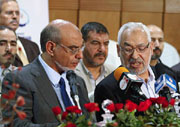VOA标准英语2011--Some Tunisians Concerned About Ruling Islamist Party's Aims(在线收听)
Some Tunisians Concerned About Ruling Islamist Party's Aims
After winning a little more than 40 percent of the seats in Tunisia's new Constituent Assembly, the moderate Islamist Ennahda party is in talks with secular rivals about forming a coalition government. Despite Ennahda's inclusive rhetoric, some fear it may roll back Tunisia's secular, pro-western policies. Protests erupted against Ennahda on Friday.
At political rallies, elegant, articulate - and bareheaded - Souad Abderrahim presents the softer face of Ennahda. The Islamist party's victory in Tunisian elections gives her a seat in the new Constituent Assembly.
This is the first time the 47-year-old pharmacist and mother of two has entered politics.
At her spacious home in the Tunis suburb of Manouba, Abderrahim explains why.
She says she joined Ennahda to counter false perceptions that it was rigid and backward.
Islamist Leaders Say Party is Moderate
The party promotes moderation and diversity, and hails Turkey as its model. Spokeswoman Yusra Ghannouchi, the daughter of Ennahda leader Rachid Ghannouchi, says Ennahda will not only maintain but increase women's rights, including the right not to wear a veil.
 |
| Rachid Ghannouchi (R), leader of the Islamist Ennahda party, speaks with his secretary-general Hamadi Jbeli (L) during a news conference in Tunis, October 28, 2011 |
"This is the not the state's business to impose any particular type of dress on women. This is absolutely a matter of personal choice," she said.
Fear of Political Islam
But some fear the party will stir the rise of political Islam. In neighboring Libya, leaders are pushing for Sharia law. Tunisia's other neighbor, Algeria, battled a bloody Islamist insurgency in the 1990s.
Islamist protesters clashed with police over two controversial movies aired in Tunisia this year. Ennahda condemned the violence.
But fresh protests erupted against Ennahda on Friday. Media say security forces fired shots into the air and tear gas at demonstrators who tried to raid the Ennahda party's headquarters.
Prominent rights activist Khadija Cherif believes the next battle here will be over the considerable rights of Tunisian women - including the right not to veil.
Cherif does not believe Ennahda will fight for women's rights as it claims. But she doesn't believe it can roll back their gains.
Eric Goldstein, regional deputy director for Human Rights Watch, says Ennahda offers mixed messages.
"The leaders of the party have...been reassuring to all Tunisians. No, we're not going to make women wear the veil. No we're not going to ban alcohol. We want to achieve our goals only through democracy. What's making some people anxious is the discourse of some of the mid-ranking members of the party, some of the preachers who preach in a really intolerant way," Goldstein said.
Still, 29-year-old blogger and journalist Haythem el Mekki says much of the worry over Islam is fueled by the West.
"Islam doesn't prevent democracy -- to the contrary. It means that everybody must offer their ideals," el Mekki said.
Ennahda has struck a chord with many voters, not just because of its religious appeal. Politician Abderrahim believes it reflects Tunisia's conservative culture.
Abderrahim claims more secular parties want complete liberty for women -- including sexual liberty and having children out of wedlock. She says that doesn't fit with Tunisian customs. Nor do homosexuality and marrying non-Muslims, she adds.
But in the workplace she believes women should be equal to men… and hold prominent jobs in Tunisia's next government.